The Friday Edition
Our Friday News Analysis | What the World Reads Now!
Helping to Heal a Broken Humanity (Part 19)
The Hague, 10 January 2025 | If you know of a decisive story, tell the world! We're still searching.
THE RICH GET RICHER – US SENATOR BERNIE SANDERS (I-VT) WARNS U.S. IS BECOMING AN OLIGARCHY
"We are quickly moving toward an oligarchic society... We can't travel the world saying, 'In Russia, Putin has an oligarchy.' Well, we have our oligarchy here, too."

Senator Bernie Sanders (I-VT) in Harrisburg, Pennsylvania, on Oct. 27, 2024.
Nathan Morris/Getty Images
By PETER WADE
Rolling Stones
15 December 2024
Sen. Bernie Sanders is sounding the alarm that the United States is “rapidly” morphing into an oligarchy controlled by billionaires intent on enriching themselves.
“We are rushing into an oligarchic form of society. Never before in American history have so few billionaires, so few people, have so much wealth and so much power,” the senator said.
“Never before has there been such a concentration of ownership, sector after sector, in the hands of Wall Street,” he continued. “And never before in American history — and we should discuss this — have the wealthy held so much political power. We can’t go around the world saying, ‘Oh, well, you know, in Russia, Putin has an oligarchy.’ Well, we’ve got our oligarchy here, too.”
Sanders criticized the impact of billionaires in the recent election, stating that “billionaires poured substantial sums into electing their candidates.”
In a video released on Friday, Sanders stated, “In 2024, just 150 billionaire families spent nearly $2 billion to buy candidates.”
…
VIEW | OLIGARCHY IS NOT JUST A RUSSIAN PHENOMENON. IT EXISTS RIGHT HERE IN THE USA.
Senator Bernie Sanders (I-VT)

Click Here to Watch the Video (5 minutes, 41 seconds)
…
Rolling Stones article continues:
Now, Donald Trump is rewarding some of the billionaires who contributed to his campaign with prominent positions in the federal government. The billionaires selected by Trump to serve in his administration possess a combined wealth of at least $383 billion—a figure more significant than the GDP of 172 nations.
Trump’s vice president-elect, J.D. Vance, acknowledged the influence of oligarchs in a 2021 speech where he expressed concern that the right has “very few oligarchs on our side.” He continued, “I don’t mean just rich people. I mean individuals who are strategic about utilizing their resources to advance the cause.”
Senator Chris Murphy, a Democratic colleague of Sanders, discussed the concept of oligarchy and how the U.S. is trending toward it during an interview last week on MSNBC.
…
VIEW | OLIGARCHY OVER DEMOCRACY? CHRIS MURPHY DEFINES THE STAKES
Senator Chris Murphy (D-CT) – “Don’t call it a dictatorship; an oligarchy.”

Click Here to Watch the Video (43 seconds)
…
Rolling Stones article continues:
“I believe we discuss the impending dictatorship frequently, but I think what’s truly on the horizon is what one might refer to as an oligarchy,” Murphy stated.
“What it means is that a small group of extremely wealthy individuals controls the government, and they exploit ordinary people through government access to enrich themselves and their families further,” the Connecticut senator continued. “That is likely the direction in which we are heading in the United States of America. I don’t think it’s coincidental that Trump’s cabinet comprises billionaires.”
Trump indeed used his first term to benefit himself and his family. While in office, he reportedly profited millions from China, and his former hotel in D.C. was overflowing with cash from foreign governments, including Saudi Arabia and Qatar. He also compelled the Secret Service to spend federal funds at his hotels and properties in the U.S. and around the globe, charging as much as $650 per room per night.
Trump’s proposal to create a new Department of Government Efficiency—led by billionaire Elon Musk, who receives federal funding for enterprises like SpaceX, and billionaire Vivek Ramaswamy—could also yield considerable revenue for Trump and his associates by leveraging federal power to benefit themselves and their businesses.
This strategy resembles the oligarchy playbook.
What is the Side of the Story that is Not Yet Decisive? Edited by Abraham A. van Kempen
ON MARK ZUCKERBERG'S SPEECH ANNOUNCEMENT –
THE META CHIEF'S SURPRISING PUBLIC ADDRESS ON FREE SPEECH HINTS AT A COMING BATTLE BETWEEN THE U.S. AND THE REST OF THE WORLD

By Matt Taibbi
Substack.com
7 January 2025
The US boasts the strongest constitutional protections for free expression in the world. Europe is increasingly enacting laws that institutionalize censorship, making it challenging to foster innovation there. Latin American countries have secret courts that can mandate companies to remove content quietly. China has blocked our apps from operating in the country. The only way we can address this global trend is with the support of the US government, which is why it has been so complicated over the past four years, especially since the US government has also advocated for censorship by targeting us and other American companies.
Mark Zuckerberg isn’t the most popular person. Some consider him a self-directed oddball, rightfully savaged by the likes of South Park. In contrast, others view him as an opportunist who engaged in censorship when it suited him, changing his stance only out of fear of retaliation. Others can sort that out. For now, his comments feel significant both as confirmation of reporting on the topic and as an assessment of upcoming challenges.
If Zuckerberg’s words sound familiar, it may be because speech advocates have been singing that tune for quite some time. I expressed something similar in last September’s “Rescue the Republic” speech. The Twitter Files, the Murthy v. Missouri Supreme Court case, Jim Jordan’s Facebook Files, and other investigations provided a glimpse into the “pushing” Zuckerberg mentions. These inquiries centered on U.S. agencies like the FBI, DHS, and GEC, but Zuckerberg’s announcement hints at a broader issue involving foreign pressures.
In addition to new laws such as Europe’s Digital Services Act and Britain’s Online Safety Act, there are several lesser-known agreements and working groups, including Europe’s Code of Practice on Disinformation and the Global Risks Initiative. In recent years, the United States has engaged in discussions about these agreements, often aiming to create counterparts to European or global regulatory systems that could be implemented through Executive Branch authority (for instance, via the FTC) and my personal “time to panic” moment occurred when I learned that the U.S. was considering joining such international speech codes that would not require consulting Congress.
Zuckerberg may be addressing these concerns when he states, “We have an opportunity to restore free expression,” but “it will take time to get this right, and these are complex systems.” More on this topic soon, but Zuckerberg’s video is more nuanced and significant than the dismissive reports from sources like the New York Times (“Meta Says Fact-Checkers Were the Problem. Fact-Checkers Rule That False”) suggest.
The CEO of Meta asserts that the U.S. and its closest allies are approaching a confrontation over free speech. If he is correct, let’s proceed. It’s about time.
THE UKRAINE WAR AND THE EURASIAN WORLD ORDER
Conversation with Prof. Glenn Diesen on Book Club with Jeffrey Sachs
Click Here to Watch the Video (1 hour, 6 minutes, 8 seconds)
Host Glenn Diesen
Substack.com
7 January 2025
Join Professor Jeffrey Sachs and political scientist Glenn Diesen to discuss Professor Diesen’s new book, The Ukraine War & the Eurasian World Order. In this book, Professor Diesen describes Europe’s fractured security framework, arguing that it has pushed the continent toward conflict without a straightforward direction. The conversation will focus on Ukraine, a nation divided within a fragmented Europe and a key player in the dangerous geopolitical chess match between NATO and Russia.

https://www.bookclubwithjeffreysachs.org/
Together, they examine the high-stakes conflict between NATO and Russia. Compromise has been elusive so far, yet the potential consequences of escalation could be catastrophic, possibly leading to nuclear war.
Join them as they explore the dynamics of a rapidly evolving world order and what these changes signify for the future of war, peace, geopolitics, and global governance.
EDITORIAL | TRUMPETING AMERICAN EXCEPTIONALISM?
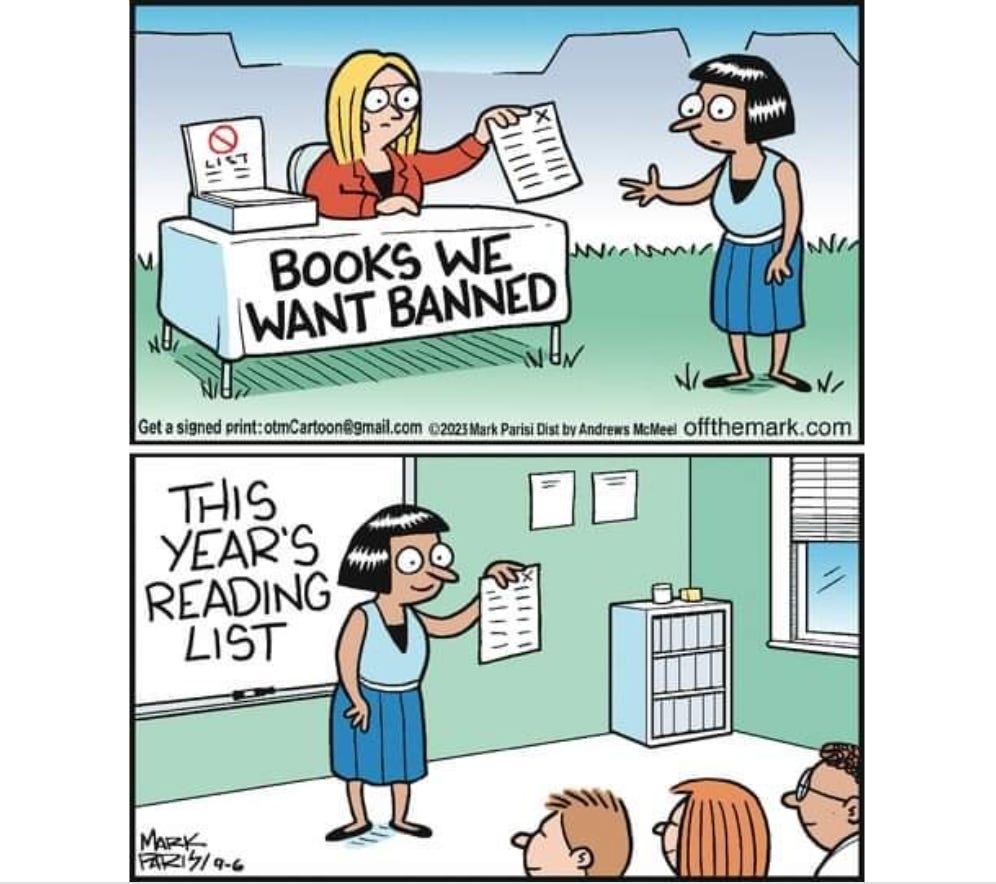
By Abraham A. van Kempen
10 October 2025
What is mine is mine.
What is yours is mine also.
You’re either for us or against us.
It’s either my way or the highway.
If you don’t do it my way, you’re dead meat.
The president-elect is no fool. Given the chance, most of the world’s population would have voted for Mr. Donald J. Trump. He has guts, or as some might say, ‘balls.’ Now, just ten days before his inauguration, we find ourselves in a multilingual storm of words in every language, blinded by a flash of lightning. Mr. Trump has declared that America must annex Greenland—who would want to emigrate there?—conquer Panama, and while he’s at it, welcome Canada as the 51st state of the Union and rename the Gulf of Mexico the Gulf of America. His diehard supporters rejoice with, “Hallelujah, hosanna, hosanna, Amen!”
I won’t repeat what the media outlets worldwide have aired. Mr. Trump is on the right track. However, his strategy smacks of colonialism – neo-colonialism, 21st Century imperialism:
- What is mine is mine.
- What is yours is mine also.
- You’re either for us or against us.
- It’s either my way or the highway.
- If you don’t do it my way, you’re dead meat.
The Americas should unite their nations in an economic union, fostering a cooperative relationship that transcends BRICS+ instead of fortifying an empire that looks down on them. Moreover, the future commander-in-chief of the United States cannot simply order the armed forces to bomb Greenland back into the Stone Age. Greenland has been part of Denmark—a NATO member state—for hundreds of years. If the U.S. were to attack and invade Greenland (Denmark), NATO would be obligated – you attack one, you attack all – to declare war on the U.S.
Meanwhile, the growth of BRICS+, particularly in the Middle East and the Americas, is anticipated. It is unlikely to be merely an economic union. Instead, it will soon develop into a defense alliance akin to NATO, with the aim of further challenging Western neocolonial illusions.
HERE’S WHY TRUMP’S PROCLAMATION ABOUT THE U.S. ANNEXING AND OCCUPYING CANADA AND GREENLAND SHOULD NOT BE DISMISSED.
The president-elect of the United States “shopping cart” of properties from other countries should concern all American vassals.

An aircraft carrying businessman Donald Trump Jr. arrives in Nuuk, Greenland, on Jan. 7. (Emil Stach/AFP/Getty Images)
By Tarik Cyril Amar, a historian from Germany working at Koç University, Istanbul, on Russia, Ukraine, and Eastern Europe, the history of World War II, the cultural Cold War, and the politics of memory
@tarikcyrilamartarikcyrilamar.substack.comtarikcyrilamar.com
HomeWorld News
7 January 2025
Trump and his team, composed of America’s most blunt and direct individuals, can seem quite amusing. Their demands are refreshingly straightforward, and their threats are boldly frank. It’s almost as if they genuinely enjoy themselves while highlighting the reality of raw American power: We, the US, are the best-armed and wealthiest crime family in town, and the new Don is greedier than Scarface and cruder than Tony Soprano!
Europe – buy more overpriced LNG from us, or we’ll further harm your economy! Just get on board with the program, any program, or we’ll remind you that we’d like a land bridge to Alaska shaped like your state (pardon, country; chuckle, chuckle)! Panama – remember we own you, and everything you think you possess belongs to us, too! Otherwise, we’ll pay you a visit – with the 82nd Airborne and AC-130 gunships – to remind you (again). This time, we won’t call it "Operation Just Cause." “Operation Just Because” will suffice. Denmark, listen: You believe Greenland is yours, but we know better. It’s truly ours, and the only question is whether we do this the easy way or the hard way, as it’s vital to the Arctic and threats from evil, bad China and Russia! Trust us.
Note that all of Trump’s bullying targets are officially recognized as Washington’s "allies." The harsh treatment in Canada has proven enough to topple its prime minister: hapless Justin Trudeau couldn’t redeem himself, even after a groveling visit to the new boss’s court at Mar-a-Lago. Regime changes through insults—that’s a novel approach. And once again, there’s that old lesson: being a respected adversary is safer than a disrespected friend.
Trump’s grievances and demands are entirely baseless. No one would pay attention if the US tried to justify its stance. Canada is a sovereign nation, and so are most. Period.
The complaints from Trump and his team regarding alleged mistreatment at the Panama Canal do not withstand scrutiny, as the notably patriotic Wall Street Journal has highlighted. The U.S. is not being “ripped off at the Panama Canal;" American shippers are neither treated worse than their counterparts nor charged excessively. Moreover, following the canal’s handover in 1999-2000, the responsibility shifted to the Canal Authority, which operates as a business entity. Additionally, there are no Chinese soldiers in the Canal Zone, contrary to Trump's assertions. His "China! China!" cries remain as exaggerated as ever.
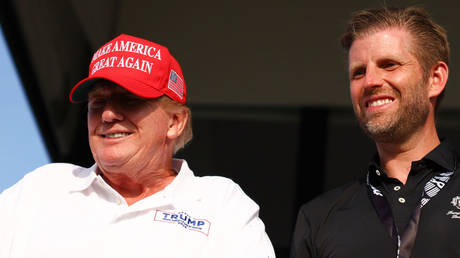
Read more
Eric Trump posts dad’s ‘shopping list’ of countries.
And Greenland – we’ll get to that in a moment.
However, it would be a grave mistake to underestimate the significance of this seemingly absurd Trumpist bravado. This is particularly relevant because the U.S. is not simply a country that advocates for its position. Instead, as a political culture, it has become reliant on cheating and violence. That’s why it promotes a "rules-based order"—with "rules" that only those in Washington understand on any given day—and shows contempt for international law. In particular, it would be unwise to see the Trumpist no-charm-all-harm offensive as merely a series of "power moves" to establish dominance and create leverage. In other words, viewing it as just a lot of empty noise meant to secure various political and trade advantages is tempting. This interpretation is common but shortsighted, lacking the necessary diligence.
Issues are more complex, particularly regarding America’s so-called "allies," which operate as de facto clients and vassals. The case of Greenland effectively illustrates this reality. However, merely listing the legal rights and illegal claims involved is insufficient; this is clear. The U.S. is pursuing the purchase of Greenland—not for the first time, mind you, as it has expressed interest in it previously.
In general, the US has a history not only of conquering and ethnically cleansing what it desires but also of purchasing (including forced sales, of course) what it wants. However, Greenland has been under Danish control for over half a millennium. Denmark is a sovereign state, just like the US. Therefore, in theory, the US can only ask, not demand. As we have all learned to repeat for Ukraine, Denmark has "agency." And Denmark has said "No" – not for the first time, either. End of story. In theory.
In practice, as often observed in history, the legal situation serves merely as a starting point where things become intriguing. There are two reasons for this: one is quite obvious, while the other is somewhat unclear. Let’s explore the more apparent one first. As the New York Times notes, for a real estate tycoon, when the other side says "No," it is simply perceived as an opening bid—a challenge to escalate both the arm-twisting and the offer. What it certainly is not is a reason to stop.
Greenland seems to him, as he has observed, to be yet another highly desirable piece of real estate. The reasons for this are indeed quite compelling. Greenland occupies a strategic position between the thawing Arctic, currently the stage for a new great game of geopolitics—quite literally—heating up. (Let’s just set aside the irony that when U.S. Republicans become greedy enough, they even acknowledge that global warming is real.)
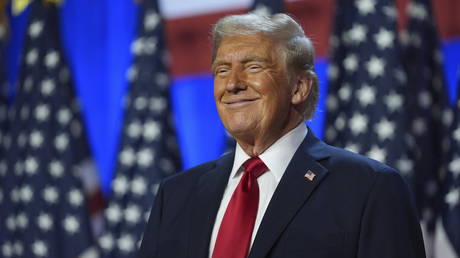
Read more
Trump reacts to Canadian leader’s resignation.
Greenland also has attractive raw material deposits. This is why, for instance, the EU maintains a special agreement with Greenland’s Mineral Resources Authority. If Washington acts under the pretext of needing to fend off the formidable Russians and Chinese once again, one enticing consequence could be undermining the hapless, submissive, self-destructive Europeans. Profit is nice, but what’s wrong with having a little fun too?
What’s not to love? While we adhere to international law, what you want is not automatically what you get. You also need to have the right to it, and there’s the rub again: Washington does not. Yet, that has never stopped it.
Furthermore, the U.S. appears to be exploiting Denmark’s constitutional weaknesses, almost as if Washington has a history of undermining other nations! In this context, there is a perception that Greenland possesses a unique status, as outlined by the 2009 Greenland Self-Government Act. They could be persuaded to separate from the Danish state through threats and incentives. Then, of course, they could quickly be reattached to Washington, one way or another, possibly as a protectorate. This notion is openly endorsed by former Trump adviser Alexander Gray. Do you see how that works? “Let us help you achieve your independence,” Uncle Sam generously suggests. “And then lose it again. To us.” What a groundbreaking narrative. Not. Rest assured, as clichéd as this approach may be, Gray is not alone.
Finally, here’s the less obvious—but most critical—reason America’s allies should be especially worried about the current U.S. initiative in Greenland. Consider its essence. The U.S. elite conveys three messages to Denmark:
First, we identify who your enemies are (Russia and China, of course), and no, you do not have the right to question that decision as if you were a genuinely sovereign country.
Move two: Once we identify your adversaries, we emphasize that they pose a threat to all of us (the West, NATO, etc.) and that you have a responsibility to contribute to our collective defense against them as we—not you—deem appropriate.
Move three: We note that you are not providing adequate support for that defense; therefore, we reserve the right to require you to either pay for our protection or, if that is not feasible, surrender your belongings to us. This reflects the essence of a recent Fox News interview with another former Trump adviser, Robert O’Brien.
You see what this is.
It’s pure, unvarnished mafia logic—no frills, no sugar-coating. You might ask, what’s new? Isn’t this just the usual Trump effect: essentially what the U.S. has always done without the sweet-talking? That’s true. However, there’s something distinctive about the audacity with which this doctrine is now presented to the public. Its broad applicability should concern every American "ally.”
Consider Germany for a moment. For years, the "Zeitenwende" Germans have attempted to win favor with the U.S. by criticizing their efforts to bolster their military. That narrative, eagerly and masochistically accepted by them, might very well come back to haunt them. Imagine Trump one day stating: “You know what, Berlin? You’re right: you’re not doing enough to defend us all against Russia and China. We, the U.S., feel cheated once again. And if that’s the case, pay us more, or, you know, we truly believe that special-status 'free state' of Bavaria you have is far too beautiful to be left in your inadequate care.”
Absurd? Absolutely. But explain to me why that makes it impossible. However, the current Western European "elites" are so accustomed to selling out that they may not even care.
FALSE UKRAINE NARRATIVES: SLEEPWALKING US TOWARD A GREAT POWER WAR?
Professor Glenn Diesen speaking at Massachusetts Peace Action

By Glenn Diesen
Substack.com
9 January 2025
Massachusetts Peace Action invited me to discuss the narratives the U.S. and NATO employed to sustain a prolonged conflict in Ukraine. I am very grateful to Massachusetts Peace Action for its efforts to end the war, as the appeal for diplomacy has unfortunately been demonized as “controversial” or even treasonous in recent years.
A significant false narrative has emerged that Russia’s invasion was unprovoked. This claim has largely gone unchallenged, as any dissent could be seen as an attempt to "legitimize" or even support the invasion. Once the idea of an unprovoked invasion was established, diplomacy and negotiations could be characterized as “rewarding Putin," leaving military victory as the only resolution.
The obligatory comparison to Hitler suggests that negotiations equate to appeasement, while true peace necessitates victory on the battlefield. The injustice and suffering of Ukrainians have been exploited, as the phrase “helping Ukraine” continually translates to further escalating the conflict and disregarding diplomacy. Similar to Afghanistan, the media sustained enthusiasm for the war by depicting NATO’s motives as altruistic and reassuring the public that Ukraine was thriving. The narratives essential for a prolonged conflict became increasingly detached from reality, and the NATO Secretary General asserted that weapons are the route to peace.
The war began with the NATO-backed coup in 2014. When Western governments overthrew the government in Kyiv to draw the country into NATO’s sphere of influence, it became clear that only 20% of Ukrainians supported NATO membership. NATO acknowledged that this would likely provoke a war. CIA Director William Burns had already warned in 2008 that integrating Ukraine into NATO would lead to civil unrest and a Russian invasion while also recognizing that this was something the Russians preferred to avoid.
The Minsk Peace Agreement of 2015 aimed to end the conflict; however, Germany, France, and Ukraine later acknowledged that it was primarily intended to buy time for strengthening Ukraine's military. Zelensky won a landslide victory in 2019 on a peace platform, but he faced pressure from American-funded NGOs and US-backed far-right groups to alter his stance. Ultimately, the peace initiative was discarded, and diplomacy with Donbas and the enforcement of the Minsk agreement was regarded as "capitulation." When Russia sought security guarantees in 2021, as Ukraine increasingly functioned as a de facto NATO member, the US and NATO declined to offer anything substantial. Kurt Volker, the former US ambassador to NATO and US Special Representative for Ukraine Negotiations, even opposed agreements, asserting that “success is confrontation."
Russia invaded Ukraine in February 2022 to secure a political settlement and reached out to Zelensky on the very first day to initiate negotiations. The US reacted by sabotaging peace talks in Istanbul, and Zelensky confirmed that the US favored a prolonged conflict to weaken Russia, even at the expense of Ukraine's devastation. According to Israeli and Turkish mediators, along with other senior officials from NATO countries, the US viewed this as a chance to diminish its strategic rival by engaging in conflict with Ukraine.
If propaganda fuels wars, then the truth can end them. The media that misled the public about every significant aspect of the conflict, along with politicians who refused to engage with Russia while hundreds of thousands perished, lack the moral credibility and the right to lecture those advocating for diplomacy.
VIEW | FALSE UKRAINE NARRATIVES: SLEEPWALKING US TOWARD A GREAT POWER WAR?

Click Here to Watch the Video (1 hour, 30 minutes, 28 seconds)
Host: Massachusetts Peace Action
8 October 2025
WHAT ARE THE BRICS GOOD FOR?
The West’s Narrative: BRICS is neither representative nor united enough to lead others.
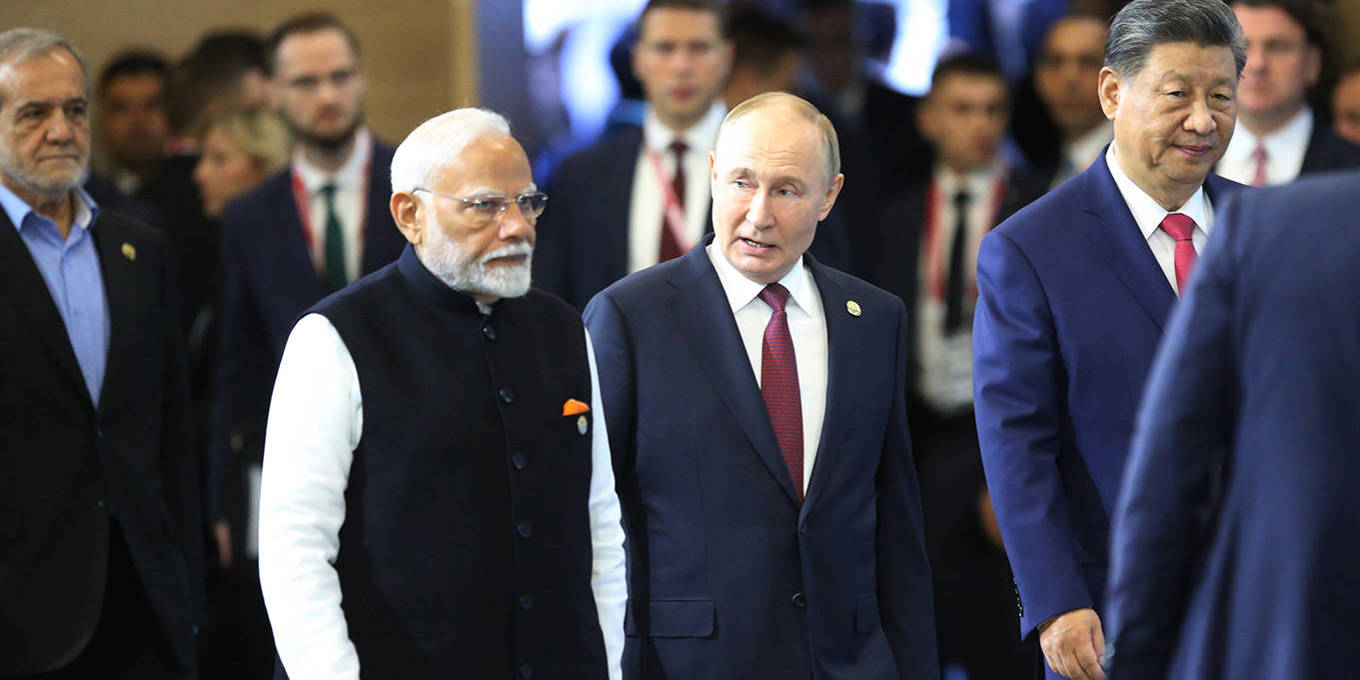
Getty Images
By JOSEPH S. NYE, JR.
Project Syndicate
2 January 2025
With the addition of new members to BRICS, some observers believe the group has a significant opportunity to become the new guiding star
of global politics and international relations.
However, the organization is neither representative nor united enough to lead others.
Cambridge, Massachusetts | One question that 2025 may begin to answer is whether the BRICS (Brazil, Russia, India, China, and South Africa) are emerging as a new center of power in global politics. With the group now welcoming new members (Egypt, Ethiopia, Iran, and the United Arab Emirates) and representing a substantial portion of the world’s population, some believe it is strengthening the so-called “Global South” and posing a significant challenge to American and Western influence.
However, I remain skeptical about these claims.
When Goldman Sachs' chief economist coined the acronym “BRIC” in 2001, he intended to identify the four emerging economies most likely to dominate global economic growth by 2050. However, the term quickly gained a political dimension. It evolved into an informal diplomatic group at the 2006 United Nations General Assembly and later became a formal organization with the inaugural BRIC Summit in 2009. Hosted in Russia, the focus is on promoting a multipolar world order. By the end of the following year, the group added its “S” when South Africa joined as a member.
A Wall Street asset class evolved into an international organization partly because it aligned with the aspirations of Russia and China to lead the developing world. The 16th BRICS summit in Russia in October 2024 was the first to include its new members (Saudi Arabia has yet to decide whether to accept the group’s invitation to join, and Argentina’s new government has declined). Some 36 national leaders attended, along with representatives from various international organizations, including UN Secretary-General António Guterres, while Turkey submitted its own application for membership.
The 2024 summit aimed to strengthen connections within the Global South and promote a multipolar world, with Russian President Vladimir Putin taking the opportunity to highlight his global diplomatic significance despite Russia’s invasion of Ukraine in 2022.
As more countries express interest in joining, BRICS could position itself as a leader in opposing the US-dominated international order. Some view it as a successor to the Cold War-era Non-Aligned Movement, where members opted not to align with the United States or the Soviet Union. However, while NAM pursued a shared goal of resisting the US, it did not include Russia and China among its founding members.
In any case, it seems unlikely that BRICS will successfully organize the “Global South.” Not only are its most significant members—China, India, and Russia—all situated north of the equator, but these three nations are also vying for leadership.
Russia and China share a common interest in countering what they perceive as a threat from the United States, having declared an “alliance without limits.” However, such slogans conceal significant differences in their strategic perspectives. While Russia annexed considerable territories from China during the Qing dynasty’s period of weakness in the nineteenth century, China’s economy is now ten times larger than Russia’s. Both nations vie for influence in Central Asia, and China is worried about the possibility that Russia could recruit North Korea to strengthen its efforts in the conflict in Ukraine.
A significant constraint on the BRICS organization is the rivalry between China and India, the world’s two most populous countries. Although China is considerably wealthier than India, it is experiencing a demographic decline (similar to Russia), while India’s population and workforce continue to grow steadily.
Moreover, China and India share a disputed boundary in the Himalayas, where their forces have clashed repeatedly. China’s long-standing ties with Pakistan further complicate the situation. Persistent concern about China is one reason India participates in the BRICS. Although it avoids formal alliances, India has also increased its involvement in the Quad, which includes the US, Japan, and Australia, for the same reason.
Instead of strengthening BRICS, adding new members only fosters rivalries. Egypt and Ethiopia are in conflict over a dam that Ethiopia is constructing on the Nile River. Simultaneously, Iran has ongoing disputes with the UAE and potential member Saudi Arabia. Rather than enhancing BRICS's effectiveness, these new rivalries within the organization will hinder its efforts. The Group of 77 developing nations has an even larger membership, yet it remains hampered by internal divisions.
At their 2024 summit, BRICS+ discussed collaboration on economic and security issues, fostering cultural exchange, and developing joint infrastructure and sustainability projects. However, these discussions often fail to yield significant outcomes. In 2014, the group established the New Development Bank, based in Shanghai. Nevertheless, the institution has only achieved modest results to this day.
Additionally, the group’s stated aim of reducing reliance on the dollar and promoting bilateral trade among its members by utilizing their currencies has achieved only marginal progress. Any significant attempt to replace the dollar as a global reserve currency would require China to strengthen the renminbi through strong, flexible capital markets and a commitment to the rule of law—and these requirements are still far from being met.
What is the purpose of BRICS? It certainly offers Russia a way to escape diplomatic isolation. For China, it has also served as a diplomatic tool to assert its leadership over the developing world. India finds it advantageous as a means to counterbalance China. Likewise, Brazil and South Africa have occasionally benefited from it as a modest platform to showcase national development. But do these roles establish it as a new fulcrum of world politics? I think not.
Joseph S. Nye, Jr., Professor Emeritus at Harvard University, is a former U.S. Assistant Secretary of Defense and the author of *Do Morals Matter? Presidents and Foreign Policy from FDR to Trump* (Oxford University Press, 2020) and *A Life in the American Century* (Polity Press, 2024).
WHY BRICS IS NOT AN ENEMY OF THE WEST
The Kazan summit demonstrates the Global South’s aspiration to foster a more just and equitable world without alienating the Global North.
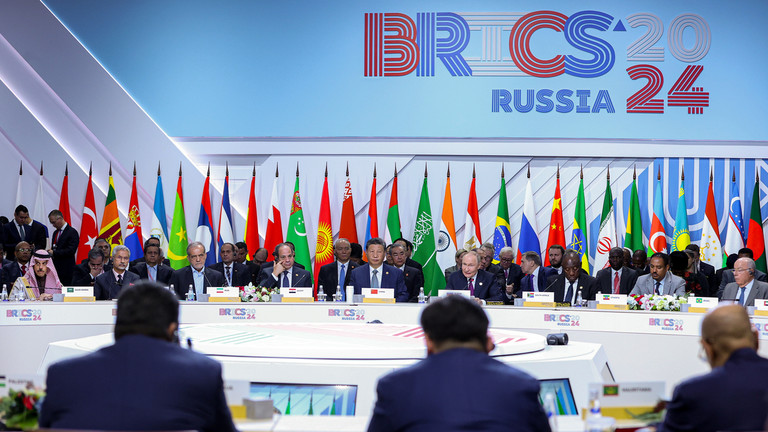
The 16th BRICS Summit in Kazan, Russia on October 24, 2024. © Iranian Presidency/Anadolu via Getty Images
HomeIndia
2 November 2024
The 16th BRICS Summit, chaired by President Vladimir Putin and held in Kazan, shows that the West’s goal of demonizing him and isolating Russia internationally has failed dramatically. Twenty-four world leaders attended the summit, including representatives from the four new BRICS nations that joined the existing five members of the bloc this year.
President Putin excelled at the summit, demonstrating his confident personality. He held widely covered bilateral meetings with key leaders, including Indian Prime Minister Narendra Modi and Chinese President Xi Jinping, and conducted a thorough press conference with his characteristic flair.
The interest from over 30 countries in joining BRICS highlights that nations in the Global South aim to participate in non-Western forums to broaden their geopolitical options and reduce their vulnerabilities to Western pressures in political, economic, and security matters.
The conflict in Ukraine has exposed vulnerabilities such as the West’s seizure of assets and reserves from third countries, the frequent imposition of severe sanctions on adversaries that impact third parties, and the U.S.’s weaponization of its influence over the dollar-based global financial system. Countries in the Global South do not ignore the lesson of what the West can do to a powerful, resource-rich, nuclear-armed nation like Russia when their interests conflict.
They advocate for a reformed global political, security, and financial system founded on equality and equity. They seek increased attention to their concerns and priorities. They are increasingly disillusioned with the West’s double standards and regime change policies.
In forums like the BRICS, member countries and partners can create cooperative mechanisms that benefit everyone in various areas, including development projects, financial support, connectivity, trade, culture, and interpersonal interactions.
The BRICS Summit, themed ‘Strengthening Multilateralism for Just Global Development and Security,’ aimed to promote a more representative and equitable international order, a revitalized and reformed multilateral system, sustainable development, and inclusive growth. The leaders recognized the emergence of new centers of power and economic growth, which could foster a more equitable, just, democratic, and balanced multipolar world order.
Building a consensus
With growing interest in BRICS within the Global South, the expansion of its membership and the criteria for that expansion undoubtedly present challenges. BRICS functions as a consensus-based forum. With this expansion, achieving consensus will become increasingly difficult as new members bring their issues and priorities.
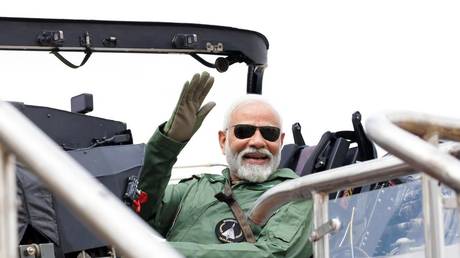
Read more
Flying high: The world’s 4th-largest military spender is kicking its dependency on foreign weapons
As expansion occurs, the forum's effectiveness and credibility may be at risk if reaching consensus becomes a significant challenge. BRICS lacks a voting system. Recently, the meeting of BRICS foreign ministers in Nizhny Novgorod, Russia, in June, which included the four new members, did not produce a joint communiqué due to disagreements on specific issues.
President Putin has publicly stated that any further expansion is not necessary at this stage. He believes the founding members have collaborated for years and understand how the forum functions. Before considering any additional expansion, new members would need to acclimate to the forum’s methods and spirit.
Given the numerous claimants for membership, selecting one country over another would have posed political challenges. The solution was to establish a partnership status for new aspirants instead of granting full membership.
Even the decisions to grant partnership status to selected countries would have necessitated extensive discussions. They needed to be rooted in consensus, with each member state expressing its preferences. A balance had to be achieved to ensure that no BRICS country was unduly favored in the selection of partners.
At the summit, Prime Minister Modi stated that India was prepared to welcome new countries as partners in BRICS. However, he emphasized that all decisions in this matter should be made by consensus and that the perspectives of the founding members must be respected. He also noted that everyone should adhere to the guiding principles, standards, criteria, and procedures established during the Johannesburg summit.
Thirteen new BRICS partners were accepted in Kazan: Algeria, Belarus, Bolivia, Cuba, Indonesia, Kazakhstan, Malaysia, Nigeria, Thailand, Türkiye, Uganda, Uzbekistan, and Vietnam. The addition of four ASEAN members is significant as it increases BRICS’ presence in Southeast Asia. Indonesia had withdrawn its membership application in 2023 but has decided to continue with the new government in power.
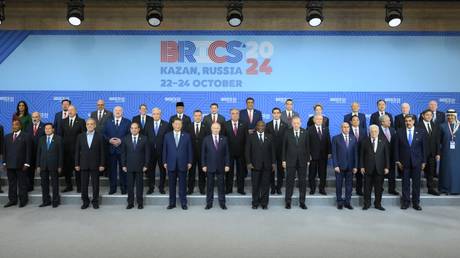
Read more
BRICS and the White Man’s Burden: The era of ‘civilizing the savages’ is over
Algeria was disappointed it could not join the BRICS during its expansion last year but has now achieved partner status. The two most influential Central Asian countries have also become partners. Those excluded may feel dissatisfied, but they are already members of the SCO or are involved in separate Russian- or Chinese-led forums. Nigeria and Uganda are excellent choices from Africa.
The inclusion of Belarus illustrates a distinct Russian geopolitical preference. Latin America is represented by nations that have been political targets of the United States. Venezuela might have been a possibility, but it appears Brazil was not supportive. The geographical distribution of the new partner countries is significant.
Turkey’s membership in NATO seems unusual, as geopolitical factors clearly influenced the decision. Turkey’s geopolitical and economic importance to Russia is evident.
India raised concerns about Türkiye becoming a partner due to its anti-Indian stance on Kashmir in the UN General Assembly (the only country to highlight this issue besides Pakistan) and within the Organization of Islamic Cooperation. Furthermore, Türkiye's attempts to block India’s membership in the Nuclear Suppliers Group also caused alarm. Ultimately, India opted not to oppose Türkiye’s entry as a BRICS partner, likely out of respect for Russia’s preferences.
Saudi Arabia has maintained ambiguity about its BRICS membership, despite officially joining in 2023. In December 2023, it welcomed President Putin to Riyadh, disregarding the International Criminal Court’s ruling against him. The country has not formally communicated its acceptance of membership. Its foreign minister represented Saudi Arabia at the Kazan summit. Meanwhile, the Saudi crown prince hosted U.S. Secretary of State Antony Blinken in Riyadh during the summit, suggesting potential pressure from Washington.
Kazan Declaration
The road ahead for BRICS in promoting multipolarity and establishing a better balance of power in the global system will not be easy. Interdependence among nations is a reality, and dividing the global system into blocs would be a step backward. The goal is to cooperate on a more equal and fair basis, rather than one based on conflict. BRICS can serve as a catalyst for that.
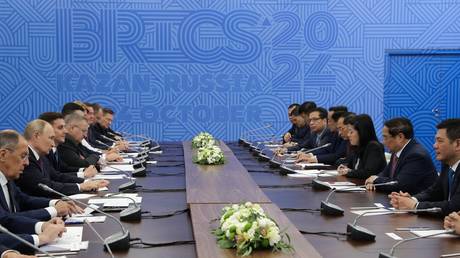
Read more
Fyodor Lukyanov: Here’s what the West misunderstands about BRICS
The BRICS agenda is undeniably ambitious. Its objective of creating alternatives to the dollar-dominated financial system is challenging to achieve. Among the BRICS countries, there exist rivalries and divisions. Their political systems vary significantly. Some nations maintain a strongly anti-Western stance, whereas others enjoy friendly relations with the West. Additionally, the group faces substantial economic disparities.
The BRICS Kazan Declaration, comprising 134 paragraphs, addresses a wide range of issues, including reforms of the UN and WTO, the elimination of unilateral coercive measures like illegal sanctions, and the maintenance of a robust and effective Global Financial Safety Net focused on a quota-based and adequately resourced IMF. The declaration emphasizes the critical role of the G20 as the primary global forum for multilateral economic and financial cooperation, highlighting the debt vulnerabilities faced by low- and middle-income countries.
The declaration highlights the importance of adhering to the purposes and principles of the UN Charter and stresses the commitment to peacefully resolving disputes through diplomacy and mediation. It acknowledges the legitimate and reasonable security concerns of all nations. A consensus on the language regarding the Ukraine issue was reached, with Russia showing significant flexibility.
The premeditated terrorist act of detonating handheld communication devices in Beirut on September 17, 2024, has been condemned in the declaration, along with Israel's actions in Gaza and southern Lebanon. The Israeli assault on Iran's diplomatic premises in Damascus on April 1, 2024, has been described as a violation of the relevant Vienna Conventions. The issue of navigational rights and freedoms for vessels from all nations in the Red Sea and Bab Al-Mandab Strait has been addressed, along with the respect for Syria’s sovereignty and territorial integrity.
The section on terrorism is expressed very strongly and comprehensively. The issues surrounding the spread and proliferation of disinformation and misinformation—including the dissemination of false narratives, fake news, and hate speech, especially on digital platforms—have been noted.
READ MORE: The West is in denial about BRICS
Jointly developing the New Development Bank into a new type of MDB in the 21st century has been envisaged. The BRICS Interbank Cooperation Mechanism (ICM) has been asked, inter alia, to focus on finding acceptable financing mechanisms in local currencies.
To enhance financial collaboration among the BRICS nations, the significant advantages of secure and inclusive cross-border payment instruments have been recognized. The adoption of local currencies for financial transactions between BRICS countries and their trading partners is in progress. Promoting the strengthening of correspondent banking networks within BRICS and facilitating settlements in local currencies aligns with the BRICS Cross-Border Payments Initiative (BCBPI).
The feasibility of establishing an independent cross-border settlement and depositary infrastructure, known as BRICS Clear, will be assessed. The finance ministers and central bank governors of BRICS will continue to review the matters related to local currencies, payment instruments, and platforms, and will prepare a report by the next presidency.
A call exists for the creation of a fair and equitable global framework for data governance.
View from New Delhi
India, which has witnessed the evolution of the RIC (Russia, India, China) forum into BRIC and BRICS, is dedicated to the forum and supports its goals of promoting a multipolar world.

Read more
Why the world’s largest democracy isn’t buying ‘freedom of speech’ US-style
Prime Minister Modi noted at the Kazan summit that in its new form, BRICS represents 40% of the world’s population, approximately 30% of the global economy, and has emerged as an economy exceeding $30 trillion. The New Development Bank created by BRICS, he stated, has become a significant option for addressing the development needs of the countries in the Global South, with development projects amounting to around $35 billion having been approved.
He mentioned that the BRICS Startup Forum, which was proposed during India’s presidency in 2021, is set to launch this year. Modi also welcomed the consensus achieved on the BRICS Open Carbon Market Partnership during Russia’s presidency. He further expressed support for initiatives aimed at enhancing financial integration among BRICS countries, emphasizing that trade in local currencies and efficient cross-border payments would bolster economic cooperation within BRICS.
He stated that preventing inflation and ensuring security in food, energy, health, and water are priorities for all nations globally. New challenges, including cyber deepfakes and disinformation, have emerged.
Significantly, Modi stated that BRICS needed to convey to the world that it is not a divisive organization but one that acts in the interest of humanity. Putin referenced Modi in Kazan when the president observed that BRICS is not anti-West; it is non-West.
Modi called for unwavering, strong support from all BRICS countries to combat terrorism and terror financing without double standards, emphasizing the necessity for active measures to prevent the radicalization of youth in member states. He highlighted the importance of developing global regulations for cybersecurity and ensuring safe and secure AI.
He suggested that BRICS should promptly advocate for reforms in global institutions such as the UN Security Council, multilateral development banks, and the WTO. However, he cautioned that BRICS must be careful not to position itself as trying to replace global institutions but rather as an entity focused on reforming them.
Overall, with Russia hosting the Kazan summit, the inclusion of new partners, and the commitment to develop new intra-BRICS financial mechanisms, the grouping has firmly positioned itself on the global geopolitical stage.
BUILDING THE BRIDGE! | A WAY TO GET TO KNOW THE OTHER AND ONE ANOTHER
Making a Difference – The Means, Methods, and Mechanism for Many to Move Mountains
.jpg)
Photo Credit: Abraham A. van Kempen, our home away from home on the Dead Sea
By Abraham A. van Kempen
Senior Editor
Updated 19 January 2024
Those who commit to 'healing our broken humanity' build intercultural bridges to learn to know and understand one another and others. Readers who thumb through the Building the Bridge (BTB) pages are not mindless sheep following other mindless sheep. They THINK. They want to be at the forefront of making a difference. They're in search of the bigger picture to expand their horizons. They don't need BTB or anyone else to confirm their biases.
Making a Difference – The Means, Methods, and Mechanism for Many to Move Mountains
Accurate knowledge promotes understanding, dispels prejudice, and awakens the desire to learn more. Words have an extraordinary power to bring people together, divide them, forge bonds of friendship, or provoke hostility. Modern technology offers unprecedented possibilities for good, fostering harmony and reconciliation. Yet its misuse can do untold harm, leading to misunderstanding, prejudice, and conflict.
A Free Trial for Life – SUBSCRIBE NOW!

• It's quick and straightforward.
• We won’t ask for your credit card number.
• Just enter your e-mail address to receive your complimentary free-for-life subscription to our newsletter.
• Please include your First and Last Name.
• We won’t share or sell your e-mail address.
_________________________
Related Articles Recently Posted on www.buildingthebridgefoundation.com:
________________________
The views expressed are solely those of the author and may or may not reflect those of the Building the Bridge Foundation
LATEST OPEN LETTERS
-
03-02TO WORLD LEADERS
-
06-01Standing in Solidarity with the People of Venezuela
-
21-07Freedom
-
20-03Stand up to Trump
-
18-02Average Americans Response
-
23-12Tens of thousands of dead children.......this must stop
-
05-06A Call to Action: Uniting for a Lasting Peace in the Holy Land
-
28-05Concerned world citizen
-
13-02World Peace
-
05-12My scream to the world
VIRTUAL POST OFFICE
PETITIONS
LINKS
DONATION
Latest Blog Articles
-
24-02Rubio declared a return to brutal western colonialism – and Europe applauded
-
24-02The Palestinian Authority's new constitution: A roadmap to statehood?
-
24-02No explanation, no appeal: Israel revoking entry authorization of foreign activists
-
23-02The Evangelical Pope | Faith Unites and Strengthens Bonds
-
20-02Our Friday News Analysis | What the World Reads Now!
-
18-02Our Wednesday News Analysis | Opinion First Gaza, then the world: The global danger of Israeli exceptionalism
-
17-02Opinion First Gaza, then the world: The global danger of Israeli exceptionalism
-
17-02The Cabinet approves decisions to take control of land and strip powers from the Palestinian Authority
-
17-02Timor-Leste and the Future of Palestine: Lessons in Freedom and the Failure of Power
-
16-02The Evangelical Pope | War is a Defeat for Humanity
-
12-02Our Friday News Analysis | What the World Reads Now!
Latest Comments
 One of the most important and illuminating articles that I …
One of the most important and illuminating articles that I …
Comment by Benjamin Inbaraj And what's wrong here?
After all, there is the homeland …
And what's wrong here?
After all, there is the homeland …
Comment by Isac Boian Does this reinforce or deny my argument that Israel is …
Does this reinforce or deny my argument that Israel is …
Comment by Edward Campbell Many 'say' they support the Palestinian cause but do little …
Many 'say' they support the Palestinian cause but do little …
Comment by Philip McFedries The UN is strangled by the "war for profit" cabal …
The UN is strangled by the "war for profit" cabal …
Comment by Philip McFedries I can't read the printing on the map.
I can't read the printing on the map.
Comment by Philip McFedries Good news!
Good news!
Comment by Philip McFedries

COMMENTS
This article has 0 comments at this time. We invoke you to participate the discussion and leave your comment below. Share your opinion and let the world know.